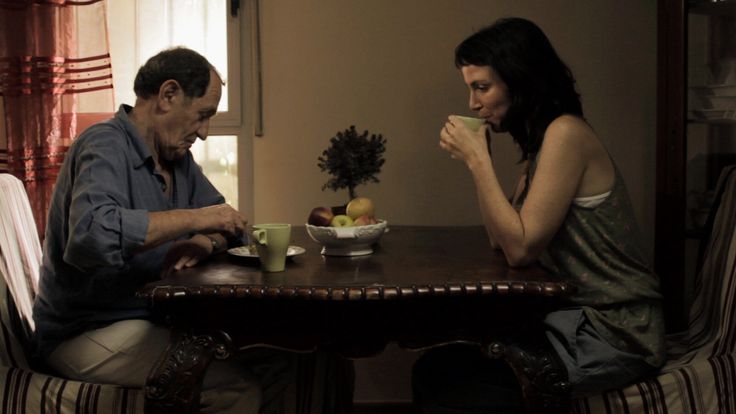Every year I’m impressed by the quality of short student films presented by the Tel Aviv University Trust. It’s delightful to see such tight storytelling in as little as 12 minutes. That’s the length of Kapunka (trailer above), the film that opened this year’s mini festival, and it set the benchmark high.
The tale of crafty Shmulik – who sees his way round the rabbinate law of shmita that decrees land be left fallow every seven years – is also timely for this is that seventh year. Shmulik’s solution to sell his land temporarily to Changrong, his senior Thai worker, with the idea of buying it back when the year is up, inevitably goes spectacularly wrong. And I do mean spectacularly! To reveal more would be a shame, but director Tal Greenberg’s abrasively funny film may well remain a unique opportunity to marvel at a Thai temple sprouting in an Israeli field like Jack’s beanstalk. Greenberg’s cinematography is gorgeous, colouring a vivid landscape, the Spaghetti Western score is spot on for a comic confrontation on the land and the actors are wonderfully matched. It’s great to see the significant community of Thai workers in Israel given space too. Greenberg is definitely one to watch.
The spotlight turns on a rather larger minority community in Leeor Kaufman’s Papa. At first sight this is a story of schoolboys bullying 11-year-old Stas, who is a recent immigrant from Russia. His violinist father is reduced to busking and Stas, desperate for acceptance into a gang of Israeli boys, is reduced to a less than filial act. Kaufman says the film is first and foremost about fatherhood, putting your children first. Poignantly Sioma Perl, the TAU theatre department carpenter who plays Papa, was a theatre director in Russia before he emigrated to Israel. No wonder his performance has such depth. Kaufman gets terrific performances out of his young actors too and his film is both poignant and unsettling.
Even more unsettling is HomeMade, Lior Sagi’s story of a kibbutz mother trying to clear her son’s name when he is arrested for molesting a kibbutz child. Sagi cleverly puts the mother in charge of the nursery of even younger children, so she first appears confidently regaling them with bright, happy children’s stories. Her body language crumples as soon as she is confronted by the adult world in which she herself has become a news story. The cruelty of the young female TV journalist by whom she has agreed to be interviewed and the eventual outcome of the film are discomfiting and Sagi is not afraid to tackle this difficult subject.
Maayan Cohen is not afraid to be explicit in his shockingly funny comedy Zazaland, about a Georgian family trying to arrange a marriage for their gay son. The contrast between the prim, po-faced bride and her family and her prospective bridegroom’s louche and rather gorgeous lover, gleefully hiding naked in his bedroom, make for squeals of audience laughter and Cohen orchestrates the increasingly farcical situation he’s created with aplomb. His film is part of a project to take inspiration from a classic Israeli film to make a new short. He’s done a great job of making a pithy, daring little comedy inspired by Dover Koshashvili's full-length drama Late Marriage and his choice of a Georgian family is a subtle extra homage to Kosashvili's Georgian heritage.
Finally, the most unashamedly charming of the five films, Lee Nechushtan’s Dinner (pictured above) proves that it’s never too late to date. Gadi, a 76-year-old local deliveryman, is looking forward to a dinner date he’s arranged via an agency, but he must first get through his busy day and one delivery threatens to scupper his evening. Veteran film and theatre actor Gedalia Besser charms as feisty Gadi and Nechushtan sets up the situation beautifully. She introduces her hero in his cosy cluttered apartment listening to an old favourite and organising his date on a cream-coloured old-fashioned Bakelite telephone, and then expertly steers her story through the encounters he has with a succession of regular customers.
On this showing the future of the Israeli film industry is safe in the hands of its graduating filmmakers and I’d be surprised if we don’t hear these five names again.
By Judi Herman


